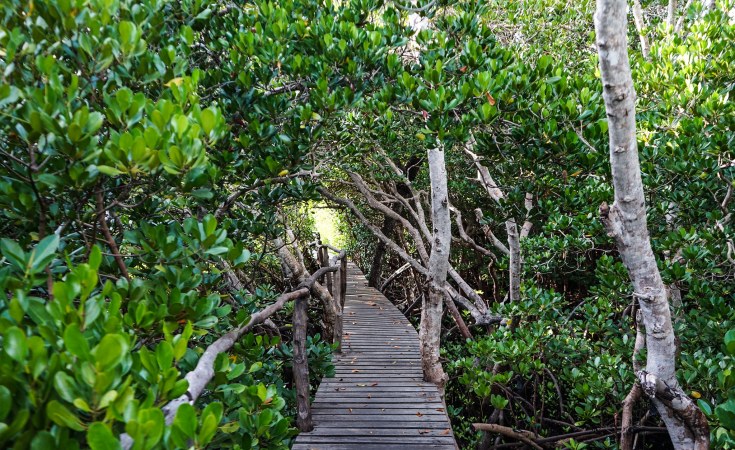During high season it gets up 1,000 customers a day with monthly earnings of up to $30,000 and employs 42 staff
In 2008, Dickson Mazinga was a chef in a five-star hotel restaurant in the Kenyan coastal town of Watamu. He quit his job to join young people from Dabaso village on the outskirts of Watamu to protect the mangrove forest. The forest was disappearing from log harvesting for home construction.
Today, Mr. Mazinga runs a high-end restaurant that hangs on top of mangrove trees, well known as a significant absorber of carbon dioxide among all trees in the world. The restaurant has substantially enhanced the forests, along with his life and the lives of many others.
Mr. Mazinga is a founding member of a group of 47 young volunteers in Dabaso village who were concerned with the destruction of the mangrove forest that had been flourishing on the shores of the Indian Ocean. They dedicated themselves to educating the villagers on the critical role the mangroves played in providing a habitat for marine life, especially at breeding stages.
"We worked as volunteers for seven years," says Mr. Mazinga. "Then some of our partners from Kenya Marine and Fisheries Research Institute (KMFRI) asked us to initiate a project that would generate income. They valued our work and its positive results. They did not want to risk losing members who might seek paid employment elsewhere."
The group was amazed at local hotels' demand for crab meat. This discovery led members to explore opening their own restaurant. Through their experience and work with other hotel business owners, they grew confident that they could open and run a profitable restaurant -- and that is what they did.
KAMFRI showed the volunteers how crabs breed under the mangroves. Mr. Mazinga says that his group was surprised to learn how many different marine species leave the broader ocean and come to hide from predators under the mangrove trees during their breeding season.
"The experts at KAMFRI taught us to harvest baby crabs and grow them for the market," Mazinga says. "They helped us build suitable cages under the mangrove to start our crab farm. As soon as we started, we had a ready market in the hotels in the coastal town."
Mr. Mazinga adds that his group was amazed at local hotels' demand for crab meat. This discovery led members to explore opening their own restaurant. Through their experience and work with other hotel business owners, they grew confident that they could open and run a profitable restaurant -- and that is what they did.
The group named its restaurant Crabshack and elected Mr. Mazinga as general manager and organizing secretary.
"Back then, I used to leave my house at 5:00 am and come home after 10:00 pm every day, and I lived in a house made of mud. I also struggled to send my children to local schools. Now, I live in my dream house made of bricks. Please come and see what we have accomplished!"
Initially, Crabshack had the capacity for serving 10 people daily. Today, the restaurant serves between 500 and 1,000 customers each day during the high season, with monthly earnings sometimes up to $30,000. The restaurant employs 42 staff from the village, some of whom are founding members of the youth group.
Asked how Crabshack has helped the youth in his village, Mr. Mazinga was quick to mention that staff are able to send their children to school without financial hardship. He adds that he benefitted personally, achieving what seemed impossible to him when he worked as a chef at five-star hotels.
"Back then, I used to leave my house at 5:00 am and come home after 10:00 pm every day, and I lived in a house made of mud. I also struggled to send my children to local schools. Now, I live in my dream house made of bricks. Please come and see what we have accomplished!" exclaims Mr. Mazinga, a proud owner of a home just 300 meters away from his restaurant.
Mr. Newton Kanhema is the Deputy Director, United Nations Information Centre - Nairobi.


